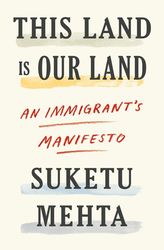It has been a year of rage. Suketu Mehta—who blazed onto the literary landscape with Maximum City, a gritty and thrilling story of Bombay—has spent the last year in a fit of rage, writing about a word that has become the most divisive and loaded in current times—immigrant. “The complexity of global migration is personal for me,” he writes in his latest, This Land is Our Land. And it is. In the book, he explores his own history of leaving home and rebuilding his life in the US. He argues passionately for immigrants. Why? As his grandfather told an elderly British man who asked him why he was there in his country: “You took all our wealth and our diamonds. Now we have come to collect.”
Mehta sees himself as a storyteller because “the power of stories matters”, he says. Well-told stories lie at the heart of salvation and are the ultimate weapon. “Populists like Trump and Modi are gifted storytellers,” he says. “But they tell false stories, although entertainingly. The only way to fight them is to tell a true story better.”
A gifted writer and storyteller, Mehta writes about arriving at the JFK airport, of being tormented as a young boy and being called a “mouse” by a bully. “I felt a sense of loss, which is why I wrote Maximum City,” he says. “I wanted to go back to Bombay and review my life. I missed my grandparents, the food, the trees with big leaves....”
Going beyond just his own story, Mehta writes about Friendship Park—“the only place along the 2,000-mile US-Mexico border where you could meet your family face-to-face”, between San Diego and Tijuana. A giant fence made of thick mesh stands between the two countries. The only human contact possible for families who drive for miles to get a glimpse of their loved ones on the other side is a “pinkie kiss”, where the tips of their fingers can touch. “I was deeply moved [after spending two weeks there],” he says. “Families were trying to reunite across the border and being stopped by bureaucrats and governments. They are coming to the US to send money to their families—to their grandmother for an operation, to their brother to send him to college, to their children. Whether it is a Bangladeshi in India or a Mexican in America, at the end of the day, most of them are good, honest people who want the same thing I want—a better life for our kids.”
The book, though relevant, has met with its share of criticism. Mehta has been attacked, got death threats and been told: “Cockroach, go back to your third world country”. But his words have also offered people dignity. “I remember getting this letter from this Indian doctor in Houston who migrated from Kerala in the 1960s,” he says. “He says that until he read my book, he always had this feeling that he was expected to be grateful. When he read my book he felt liberated. He felt he did not need to be grateful. He was contributing to America.”
THIS LAND IS OUR LAND: AN IMMIGRANT’S MANIFESTO
Author: Suketu Mehta
Publisher: Penguin Random House
Price: Rs599; pages: 304



